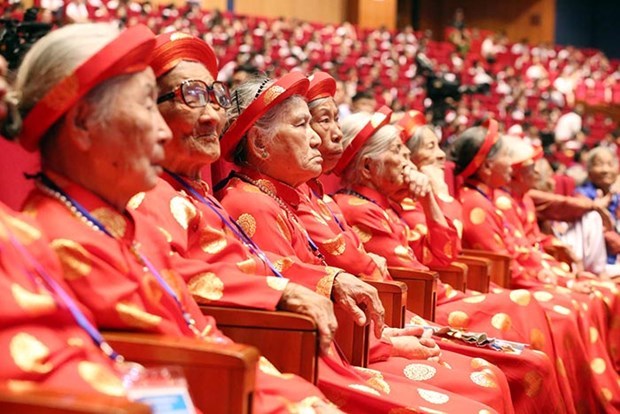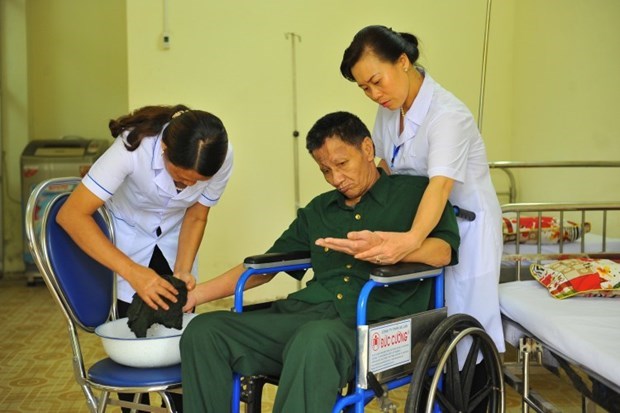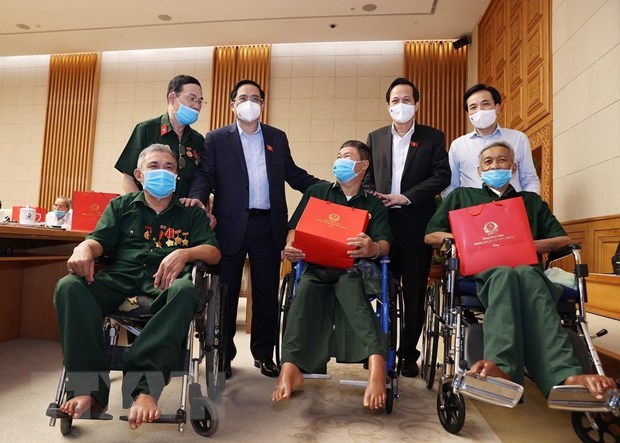Political system, people join hands in caring for revolution contributors
Seventy-four years have passed since the War Invalids and Martyrs Day (July 27) came into being, people across the country are still turning their hearts towards nation contributors via gratitude expressing activities and improved support policies.
 Prime Minister Pham Minh Chinh meets with representatives of revolution contributors on July 24 (Photo: VNA)
Prime Minister Pham Minh Chinh meets with representatives of revolution contributors on July 24 (Photo: VNA)Statistics show that there are more than 9.2 million revolution contributors nationwide, accounting for nearly 10 percent of the population.
Every year, nearly 30 trillion VND (1.3 billion USD) from the State budget is spent on providing preferential treatment and caring for these people. The preferential policies for them have been increasingly improved, covering most aspects of life, from health care, education and housing to credit.
Ongoing journey to repay revolution contributors
The revised ordinance on preferential treatment for revolution contributors took effect this year. Despite numerous difficulties facing the country amid the COVID-19 pandemic, the National Assembly Standing Committee still issued the ordinance, which features many new points that increase benefits for and expand beneficiary groups. This reflects the Party and State’s special attention to the contributors.
On the occasion of this year’s War Invalids and Martyrs Day, President Nguyen Xuan Phuc decided to raise the value of gifts for revolution contributors, war invalids, and relatives of martyrs by 50 percent.
 Under new regulations, the Heroic Vietnamese Mothers will receive monthly financial aid of 4.872 million VND (Photo: VNA)
Under new regulations, the Heroic Vietnamese Mothers will receive monthly financial aid of 4.872 million VND (Photo: VNA)Apart from the benefits provided by the Party and State, the “Den on dap nghia” (Gratitude) Fund and the movement calling on all people to care for revolution contributors and their families have attracted great support from the public.
In 2020, the Gratitude Fund received donations of more than 2.58 trillion VND, helping to present over 52,000 savings accounts and build or repair 54,000 houses for the contributors and their families.
Although war already became a thing of the past, some revolution contributors have yet to be recognised or benefit from preferential policies. To ensure all of them can gain preferential treatment, agencies in charge of labour, invalids and social affairs have promoted the settlement of unresolved dossiers over the last three years.
 A war invalid is cared for at a nursing centre (Photo: VNA)
A war invalid is cared for at a nursing centre (Photo: VNA)Since the beginning of 2021, MoLISA agencies have received 1,544 samples, including 399 samples of martyrs’ remains and 217 others of martyrs’ relatives, and handed over them to specialised units for DNA testing.
All these actions demonstrate the gratitude that people nowadays wish to express to the ones falling down for the sake of national independence and freedom.
Caring for revolution contributors amid pandemic
Despite the COVID-19 pandemic’s severe impact on society, authorities at all levels, sectors, and localities are still carrying out activities in acknowledgement of revolution contributors on the occasion of the War Invalids and Martyrs Day (July 27).
Leaders of the Party, the State, ministries, and sectors have visited and presented gifts to outstanding contributors. In localities, annual activities like visiting and presenting gifts to revolution contributors and their families, and paying tribute to martyrs at cemeteries have also been organised.
MoLISA Minister Dao Ngoc Dung has requested localities nationwide to step up gratitude expressing activities and mobilise social resources for caring for revolution contributors.
The pandemic, which has hampered large-scale events to mark this year’s War Invalids and Martyrs Day, should not be cited as the excuse for the absence of care for revolution contributors, he said, noting that all activities must be carried out in an appropriate manner that suits the COVID-19 situation and conditions of each locality.
 Prime Minister Pham Minh Chinh meets with revolution contributors ahead of the War Invalids and Martyrs Day (Photo: VNA)
Prime Minister Pham Minh Chinh meets with revolution contributors ahead of the War Invalids and Martyrs Day (Photo: VNA)Aside from new policies issued by the Party and State, contributions by the public have also become an indispensable resource for carrying out support policies and preferential treatment for revolution contributors./.
| There are more than 9.2 million revolution contributors nationwide at present, including nearly 1.4 million people benefiting from monthly aid and over 4,000 Heroic Vietnamese Mothers under the care of agencies and organisations. |













